Remove Backslashes or Forward slashes from String in Python
Last updated: Apr 10, 2024
Reading time·10 min

# Table of Contents
- Remove backslashes from a String in Python
- Remove forward slash from a String in Python
- Remove the trailing Slash from a String in Python
- Remove leading and trailing Slash from String in Python
- Replace double backslash with single backslash in Python
- Replace single backslash with double backslash in Python
# Remove backslashes from a String in Python
Use the str.replace() method to remove the backslashes from a string, e.g.
string.replace('\\', '').
The str.replace() method will remove the backslashes from the string by
replacing them with empty strings.
string = '\\bobby\\hadz\\com\\' print(string) # 👉️ \bobby\hadz\com\ # ✅ Remove all backslashes from a string new_string = string.replace('\\', '') print(new_string) # 👉️ bobbyhadzcom # --------------------------------------------------- # ✅ Remove the first occurrence of backslash from a string new_string = string.replace('\\', '', 1) print(new_string) # 👉️ bobby\hadz\com\
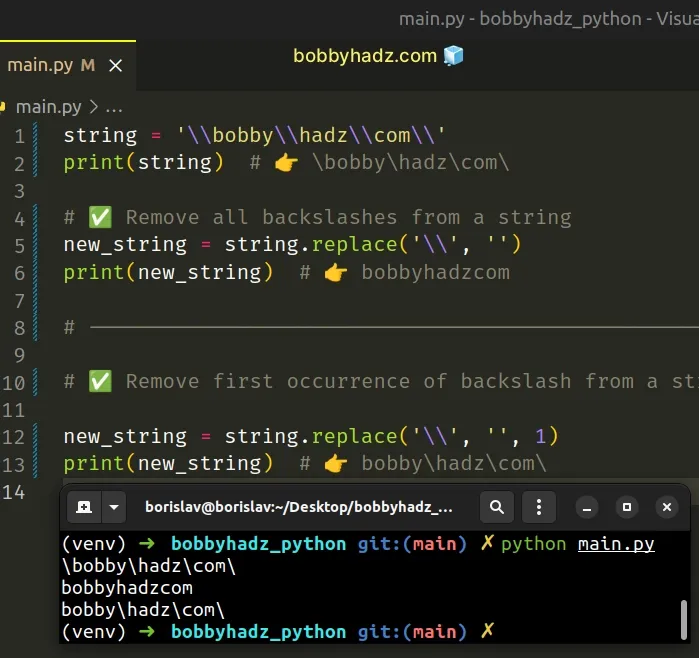
We used the str.replace() method to remove the backslashes from a string.
\ character has a special meaning in Python - it is used as an escape character (e.g. \n or \t).By adding a second backslash, we treat the backslash (\) as a literal
character.
my_str = 'bobby \\ hadz' print(my_str) # 👉️ bobby \ hadz
The str.replace() method returns a copy of the string with all occurrences of a substring replaced by the provided replacement.
The method takes the following parameters:
| Name | Description |
|---|---|
| old | The substring we want to replace in the string |
| new | The replacement for each occurrence of old |
| count | Only the first count occurrences are replaced (optional) |
The method doesn't change the original string. Strings are immutable in Python.
string = '\\bobby\\hadz\\com\\' print(string) # 👉️ \bobby\hadz\com\ string = string.replace('\\', '') print(string) # 👉️ bobbyhadzcom
If you only need to remove the first backslash character from the string, set
the count argument to 1 in the call to str.replace().
string = '\\bobby\\hadz\\com\\' print(string) # 👉️ \bobby\hadz\com\ new_string = string.replace('\\', '', 1) print(new_string) # 👉️ bobby\hadz\com\
When the count argument is set, only the first count occurrences are
replaced.
If you only need to remove the leading and trailing backslashes from a string,
use the str.strip() method.
string = '\\bobby\\hadz\\com\\' print(string) # 👉️ \bobby\hadz\com\ new_string = string.strip('\\') print(new_string) # 👉️ bobby\hadz\com
The str.strip() method returns a copy of the string with the specified leading and trailing characters removed.
If you only need to remove the leading or trailing backslashes from a string,
use the str.lstrip() or
str.rstrip() method.
string = '\\bobby\\hadz\\com\\' print(string) # 👉️ \bobby\hadz\com\ # ✅ Remove leading backslashes from a string new_string = string.lstrip('\\') print(new_string) # 👉️ bobby\hadz\com\ # ✅ Remove trailing backslashes from a string new_string = string.rstrip('\\') print(new_string) # 👉️ \bobby\hadz\com
The str.lstrip() method takes a string containing characters as an argument and returns a copy of the string with the specified leading characters removed.
The str.rstrip method takes a string containing characters as an argument and returns a copy of the string with the specified trailing characters removed.
# Remove forward slash from a String in Python
You can also use the str.replace() method to remove the forward slashes from a
string.
string = '/bobby/hadz/com/' print(string) # 👉️ \bobby\hadz\com\ # ✅ Remove forward slashes from string new_string = string.replace('/', '') print(new_string) # 👉️ bobbyhadzcom # ------------------------------------------- # ✅ Remove backslashes from string string = '\\bobby\\hadz\\com\\' new_string = string.replace('\\', '') print(new_string) # 👉️ bobbyhadzcom
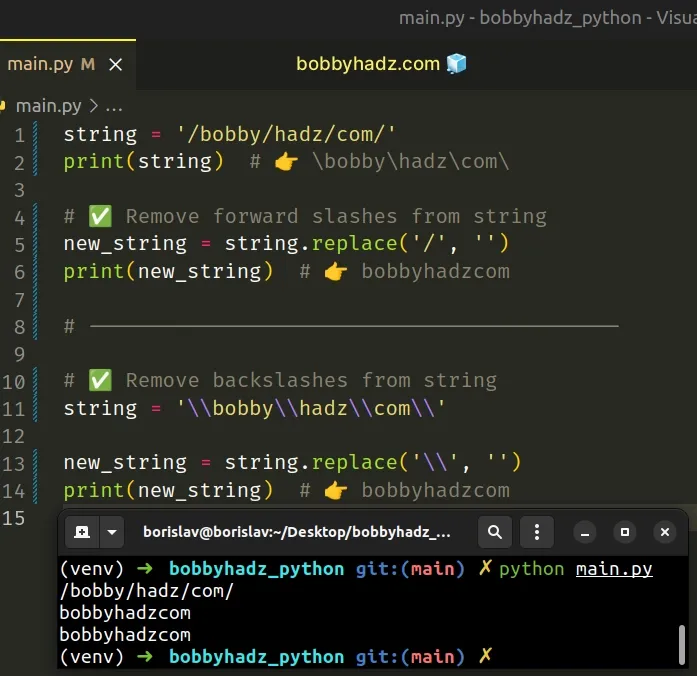
The first example removes the forward slashes from a string and the second example removes the backslashes.
\n, so we added a second backslash to treat them as literal characters.To remove the forward slashes from the string, we simply replace each forward slash with an empty string.
string = '/bobby/hadz/com/' print(string) # 👉️ \bobby\hadz\com\ new_string = string.replace('/', '') print(new_string) # 👉️ bobbyhadzcom
The str.replace() method returns a copy of the string with all occurrences of a substring replaced by the provided replacement.
The method takes the following parameters:
| Name | Description |
|---|---|
| old | The substring we want to replace in the string |
| new | The replacement for each occurrence of old |
| count | Only the first count occurrences are replaced (optional) |
The method doesn't change the original string. Strings are immutable in Python.
string = '/bobby/hadz/com/' print(string) # 👉️ \bobby\hadz\com\ string = string.replace('/', '') print(string) # 👉️ bobbyhadzcom
If you only need to remove the first forward slash from the string, set the
count argument to 1 in the call to str.replace().
string = '/bobby/hadz/com/' print(string) # 👉️ \bobby\hadz\com\ string = string.replace('/', '', 1) print(string) # 👉️ bobby/hadz/com/
When the count argument is set, only the first count occurrences are
replaced.
str.strip() method.string = '/bobby/hadz/com/' print(string) # 👉️ \bobby\hadz\com\ string = string.strip('/') print(string) # 👉️ bobby/hadz/com
The str.strip() method returns a copy of the string with the specified leading and trailing characters removed.
If you only need to remove the leading or trailing forward slashes from a
string, use the str.lstrip() or str.rstrip() method.
string = '/bobby/hadz/com/' print(string) # 👉️ \bobby\hadz\com\ new_string = string.lstrip('/') print(new_string) # 👉️ bobby/hadz/com/ new_string = string.rstrip('/') print(new_string) # 👉️ /bobby/hadz/com
The str.lstrip method takes a string containing characters as an argument and returns a copy of the string with the specified leading characters removed.
The str.rstrip method takes a string containing characters as an argument and
returns a copy of the string with the specified trailing characters removed.
# Remove the trailing Slash from a String in Python
Use the str.rstrip() method to remove the trailing slash from a string.
string = '/bobby/hadz/com/' # ✅ Remove the trailing forward slash from a string new_string = string.rstrip('/') print(new_string) # 👉️ /bobby/hadz/com # -------------------------------------- # ✅ Remove the trailing backslash from a string string = '\\bobby\\hadz\\com\\' new_string = string.rstrip('\\') print(new_string)
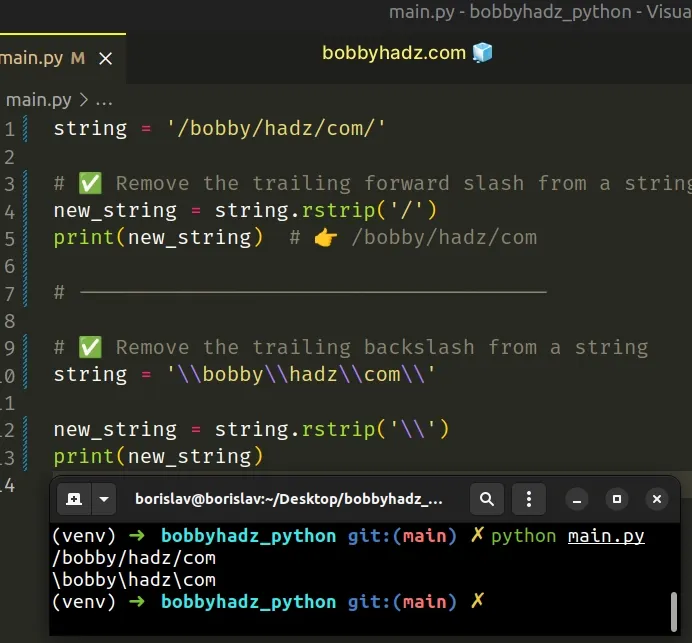
The str.rstrip() method will return a copy of the string with the trailing
slash removed.
The first example removes the trailing forward slashes from a string and the second example removes the trailing backslashes.
The str.rstrip() method takes a string containing characters as an argument
and returns a copy of the string with the specified trailing characters removed.
string = '/bobby/hadz/com/' new_string = string.rstrip('/') print(new_string) # 👉️ \bobby\hadz\com
The method doesn't change the original string, it returns a new string. Strings are immutable in Python.
string = '/bobby/hadz/com/' string = string.rstrip('/') print(string) # 👉️ /bobby/hadz/com
Note that the str.rstrip() method removes one or more occurrences of the
specified character from the end of the string.
string = '/bobby/hadz/com///' string = string.rstrip('/') print(string) # 👉️ /bobby/hadz/com
If you need to only remove the last character if it's a slash, use the
str.endswith() method.
# Remove the trailing Slash from a String using string slicing
This is a two-step process:
- Use the
str.endswith()method to check if the string ends with a backslash. - If the condition is met, use string slicing to remove the trailing slash.
string = '/bobby/hadz/com//' if string.endswith('/'): string = string[:-1] print(string) # 👉️ /bobby/hadz/com/
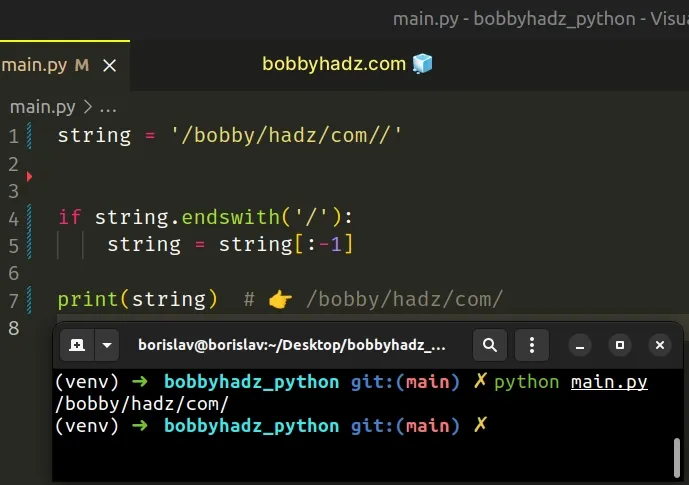
We used the str.endswith() method to check if the string ends with a forward
slash.
You can use the same approach to remove the trailing backslash from a string.
string = '\\bobby\\hadz\\com\\' if string.endswith('\\'): string = string[:-1] print(string) # 👉️ \bobby\hadz\com
The
str.endswith()
method returns True if the string ends with the provided suffix, otherwise the
method returns False.
If the condition is met, we use string slicing to remove the last character from the string.
The syntax for string slicing
is my_str[start:stop:step].
start index is inclusive, whereas the stop index is exclusive (up to, but not including).Python indexes are zero-based, so the first character in a string has an index
of 0, and the last character has an index of -1 or len(my_str) - 1.
The slice string[:-1] starts at index 0 and goes up to, but not including
the last character of the string.
# Remove leading and trailing Slash from String in Python
Use the str.strip() method to remove the leading and trailing slash from a
string.
string = '/bobby/hadz/com/' print(string) # 👉️ /bobby/hadz/com/ # ✅ Remove leading and trailing forward slash from string new_string = string.strip('/') print(new_string) # 👉️ bobby/hadz/com # ------------------------------------------------------- # ✅ Remove leading and trailing backslash from string string = '\\bobby\\hadz\\com\\' print(string) # 👉️ \bobby\hadz\com\ new_string = string.strip('\\') print(new_string) # 👉️ bobby\hadz\com
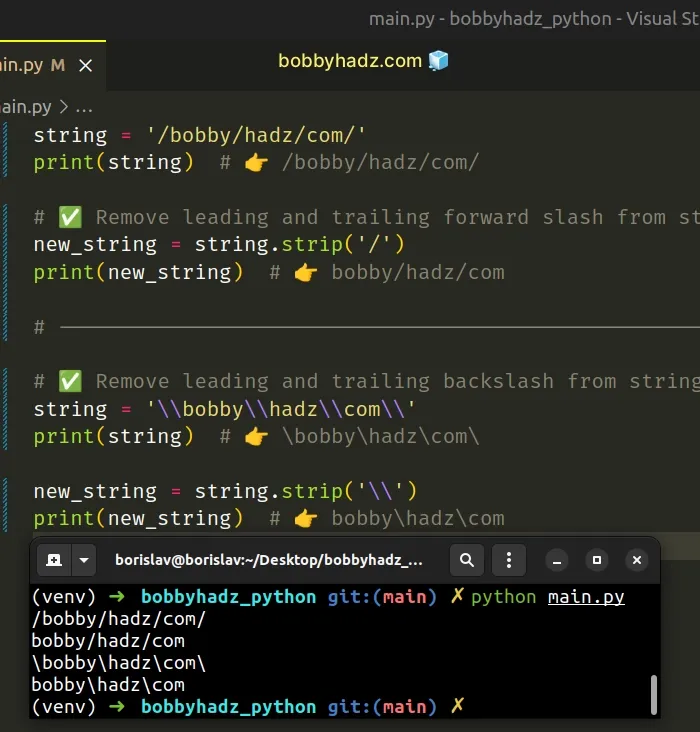
The first example removes the leading and trailing forward slashes from a string and the second removes the leading and trailing backslashes.
The str.strip() method returns a copy of the string with the specified leading and trailing characters removed.
string = '/bobby/hadz/com/' print(string) # 👉️ /bobby/hadz/com/ new_string = string.strip('/') print(new_string) # 👉️ bobby/hadz/com
The method doesn't change the original string, it returns a new string. Strings are immutable in Python.
str.lstrip() or str.rstrip() method.string = '/bobby/hadz/com/' new_string = string.lstrip('/') print(new_string) # 👉️ bobby/hadz/com/ new_string = string.rstrip('/') print(new_string) # 👉️ /bobby/hadz/com
The str.lstrip() method takes a string containing characters as an argument and returns a copy of the string with the specified leading characters removed.
The str.rstrip() method takes a string containing characters as an argument and returns a copy of the string with the specified trailing characters removed.
str.strip(), str.lstrip() and str.rstrip() method remove one or more occurrences of the specified leading and trailing characters.string = '///bobby/hadz/com///' string = string.strip('/') print(string) # 👉️ bobby/hadz/com
If you need to only remove the first leading and trailing slash, use the
str.startswith() and str.endswith() methods.
# Remove leading and trailing Slash from String using string slicing
This is a three-step process:
- Use the
str.startswith()method to check if the string starts with a slash. - Use the
str.endswith()method to check if the string ends with a slash. - If the conditions are met, use string slicing to remove the slashes.
string = '//bobby/hadz/com//' print(string) # 👉️ \bobby\hadz\com\ if string.startswith('/'): string = string[1:] if string.endswith('/'): string = string[:-1] print(string) # 👉️ /bobby/hadz/com/
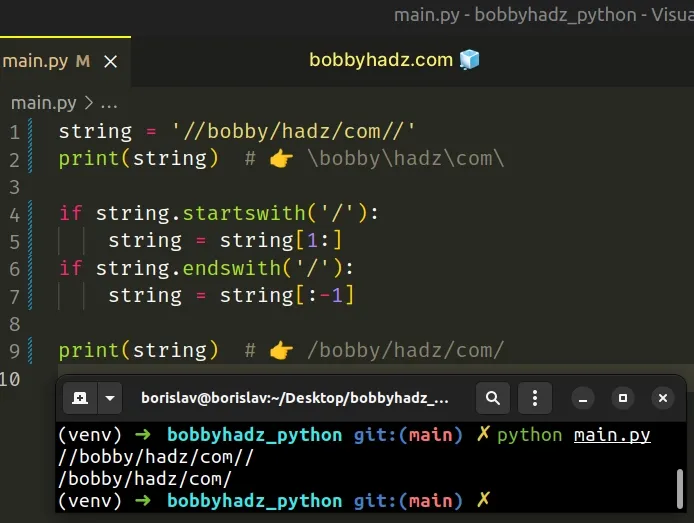
We used the str.startswith() and str.endswith() methods to check if the
string starts with and ends with a slash.
The
str.startswith()
method returns True if the string starts with the provided prefix, otherwise
the method returns False.
The
str.endswith()
method returns True if the string ends with the provided suffix, otherwise the
method returns False.
If the conditions are met, we use string slicing to remove the first and last characters from the string.
The syntax for string slicing is my_str[start:stop:step].
start index is inclusive, whereas the stop index is exclusive (up to, but not including).Python indexes are zero-based, so the first character in a string has an index
of 0, and the last character has an index of -1 or len(my_str) - 1.
The slice string[1:] starts at index 1 and goes to the end of the string.
The slice string[:-1] starts at index 0 and goes up to, but not including
the last character of the string.
# Replace double backslash with single backslash in Python
The str.replace() method can also be used to replace double backslash with
single backslash.
string = 'bobby\\\\hadz\\\\com' print(string) # 👉️ bobby\\hadz\\com new_string = string.replace('\\\\', '\\') print(new_string) # 👉️ bobby\hadz\com # ----------------------------------- string = r'bobby\hadz\com' print(string) # 👉️ bobby\hadz\com
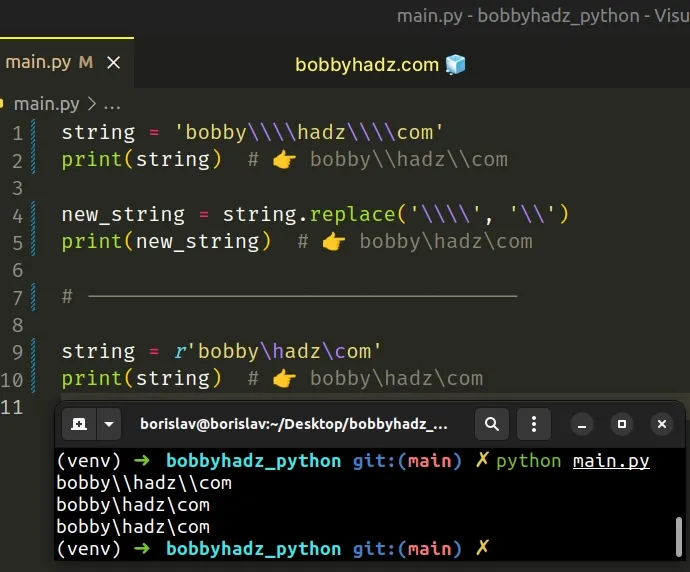
\ character has a special meaning in Python - it is used as an escape character (e.g. \n or \t).By adding a second backslash, we treat the backslash (\) as a literal
character.
my_str = 'bobby \\ hadz' print(my_str) # 👉️ bobby \ hadz
To have two backslashes next to one another, we have to use four backslash characters.
my_str = 'bobby \\\\ hadz' print(my_str) # 👉️ bobby \\ hadz
The str.replace method returns a copy of the string with all occurrences of a substring replaced by the provided replacement.
string = 'bobby\\\\hadz\\\\com' print(string) # 👉️ bobby\\hadz\\com new_string = string.replace('\\\\', '\\') print(new_string) # 👉️ bobby\hadz\com
The method takes the following parameters:
| Name | Description |
|---|---|
| old | The substring we want to replace in the string |
| new | The replacement for each occurrence of old |
| count | Only the first count occurrences are replaced (optional) |
The method doesn't change the original string. Strings are immutable in Python.
# Processing an escape sequence with bytes.decode()
If you need to process an escape sequence, use the bytes.decode() method.
string = 'bobby\\nhadz' new_string = bytes(string, "utf-8").decode("unicode_escape") # bobby # hadz print(new_string)
We used the
bytes() class to
convert the string to a bytes object and then used the bytes.decode() method
to decode the bytes object into a string with the unicode_escape encoding.
string = r'bobby\hadz\com' print(string) # 👉️ bobby\hadz\com string = r'bobby\\hadz\\com' print(string) # 👉️ bobby\\hadz\\com
Strings that are prefixed with r are called
raw strings
and treat backslashes as literal characters.
We don't have to escape backslashes in raw strings.
If you need to use variables in a raw string, use a formatted string literal.
variable = 'maybe' my_str = fr'yes\no\{variable}' print(my_str) # 👉️ yes\no\maybe
f.Make sure to wrap expressions in curly braces - {expression}.
Notice that we prefixed the string with fr and not just with f.
# Replace single backslash with double backslash in Python
The same approach can be used to replace single with double backslash.
string = '\\bobby\\hadz\\com\\' print(string) # 👉️ \bobby\hadz\com\ result = string.replace('\\', '\\\\') print(result) # 👉️ \\bobby\\hadz\\com\\
We used the str.replace() method to replace a single backslash with two
backslashes.
\ character has a special meaning in Python - it is used as an escape character (e.g. \n or \t).By adding a second backslash, we treat the backslash (\) as a literal
character.
my_str = 'bobby \\ hadz' print(my_str) # 👉️ bobby \ hadz
To have two backslashes next to one another, we have to use four backslash characters.
my_str = 'bobby \\\\ hadz' print(my_str) # 👉️ bobby \\ hadz
The str.replace method returns a copy of the string with all occurrences of a substring replaced by the provided replacement.
string = '\\bobby\\hadz\\com\\' print(string) # 👉️ \bobby\hadz\com\ result = string.replace('\\', '\\\\') print(result) # 👉️ \\bobby\\hadz\\com\\
The method takes the following parameters:
| Name | Description |
|---|---|
| old | The substring we want to replace in the string |
| new | The replacement for each occurrence of old |
| count | Only the first count occurrences are replaced (optional) |
The method doesn't change the original string. Strings are immutable in Python.
If you have access to the variable that declared the string, you can mark it as a raw string.
string = r'\\bobby\\hadz\\com\\' print(string) # 👉️ \\bobby\\hadz\\com\\ string = r'C:\Users\BobbyHadz\Desktop\example.txt' print(string) # 👉️ C:\Users\BobbyHadz\Desktop\example.txt
Strings that are prefixed with r are called raw strings and treat backslashes
as literal characters.
We don't have to escape backslashes in raw strings.
If you need to use variables in a raw string, use a formatted string literal.
variable = 'maybe' my_str = fr'yes\no\{variable}' print(my_str) # 👉️ yes\no\maybe
f.Make sure to wrap expressions in curly braces - {expression}.
Notice that we prefixed the string with fr and not just with f.
# Additional Resources
You can learn more about the related topics by checking out the following tutorials:
- How to remove Accents from a String in Python
- Remove all Non-Numeric characters from a String in Python
- How to remove the 'b' prefix from a String in Python
- Remove the empty lines from a String in Python
- Remove all Empty Strings from a List of Strings in Python
- Remove First and Last Characters from a String in Python
- Remove first occurrence of character from String in Python
- Remove the First N characters from String in Python
- Remove the HTML tags from a String in Python

